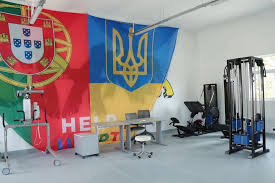Rehabilitation center for injured Ukraine soldiers opens in Portugal

Marie-Line Darcy
Lison: “I sincerely hope to return to the front lines as soon as I recover,” said Maksym Pavli, a 22-year-old Ukrainian soldier wounded in the war against Russia. After initial surgery in Ukraine, he joined 14 other comrades in mid-June at the rehabilitation center in Aldeia Nova, a small village in the Ourém region, north of Lisbon.
Despite his calm demeanor, Pavli’s gaze sometimes appears distant. “I had just finished my studies in computer programming and was working for six months when the war broke out. I hadn’t planned to fight, but when mandatory enlistment at 21 was announced, I joined.” His injury is invisible. “A friend replaced me in a trench. He was killed instantly by a Russian missile. It could have been me,” he said, lowering his voice.
The rehabilitation center in the Portuguese countryside was established by Help-UAPT, a Ukrainian association based in Portugal. It took two years to restore the buildings—leased for seven years—of an old seminary that previously housed a school for needy children. The white buildings, arranged around a large courtyard in an L-shape, are now pristine. “There’s no room in Ukrainian hospitals for the wounded from the frontline. Surgeries are done on-site in Ukraine. Here, it’s all post-operative care,” explained Vitaly Melichuk, a Help-UAPT official. The center, named “Phoenix” after the mythical bird rising from its ashes, is adorned with its emblem in the courtyard. The renovation was funded by companies such as Portuguese retailer Sonae and French DIY retailer Adeo, as well as donations from a foreign evangelical church and association members.
The renovation cost over $1.6 million, and the center will eventually accommodate 200 patients. The common areas, simple yet comfortable rooms, medical beds, and state-of-the-art gym would make any clinic envious. “This is the result of Portugal’s determination. It’s a small European country with immense human compassion. It’s an example to follow. I hope other centers will be established,” commented Angelo Neto, spokesperson for Help-UAPT.
Volunteers played a significant role in setting up the space. Tatyana, a Ukrainian-Portuguese, lost count of the hours spent restoring the buildings. “Our compatriots are fighting to protect Europe,” she said, justifying their presence. “It’s calm here, no sirens to frighten them.” The soldiers will also receive psychological support. Lada, a psychotherapist, volunteered to assist the patients. “Portugal lacks healthcare professionals specialized in war trauma. I’ve been trained by Ukrainian doctors. In this field, you need to speak the language,” she explained in hesitant Portuguese. “I want to rest and recover. Then I will return to the front,” said Pavli, who has since returned to Ukraine after two weeks at the center.
The senior Ukrainian military officials accompanying the first group of 15 soldiers remain discreet about the operation, which carries risks due to the geographical distance between the two countries. The group’s journey was tumultuous: Poland initially denied them access to Warsaw, where they were to catch a flight to Lisbon. It took the intervention of Portuguese ambassadors and the association to persuade the Poles. “This is a test for the Ukrainian army. The Phoenix mission is a success,” celebrated Neto. The future will depend on many factors, starting with funding. Ultimately, Phoenix plans to build at least 20 bungalows to accommodate refugee families.
Portugal hosts 60,000 Ukrainian refugees under the European Union’s temporary protection scheme (Eurostat, April 2024).
Lisbon plans to spend close to $240 million in 2024 on aid to Ukraine, including technical support, drones, and training. The same amount is expected to be allocated in 2025.
At the end of the 20th century, Portugal welcomed many Ukrainians. However, the economic crises of 2002 and especially 2008 led to some of them leaving. Those who stayed settled with their families, often working in construction and services.





